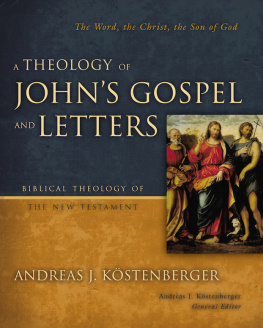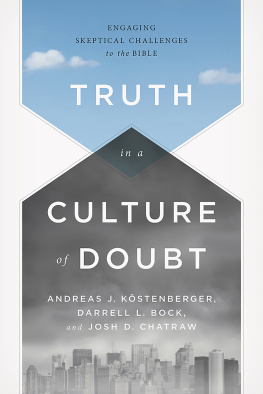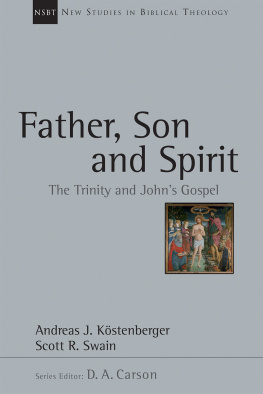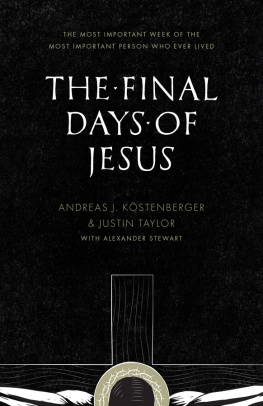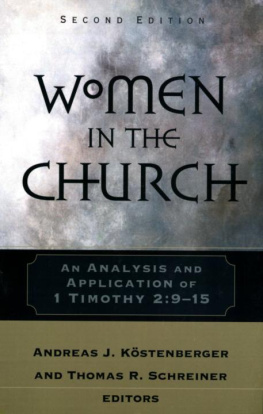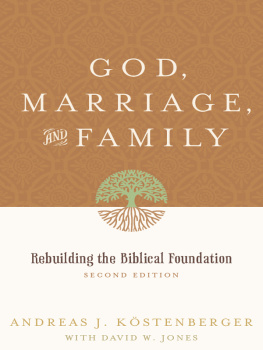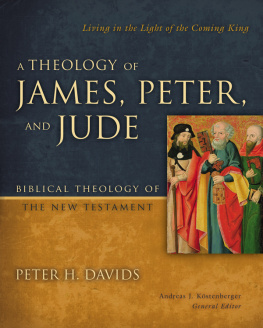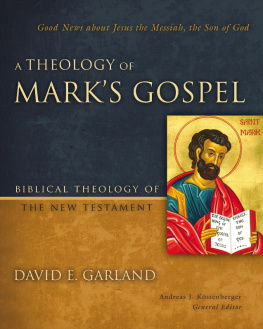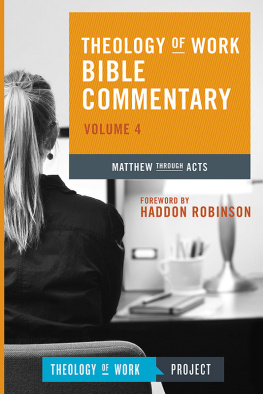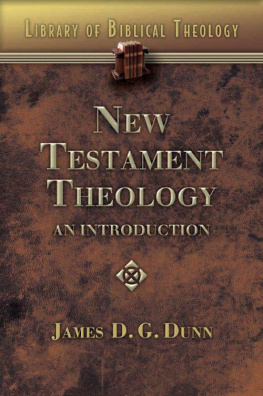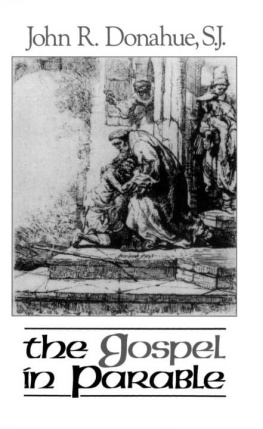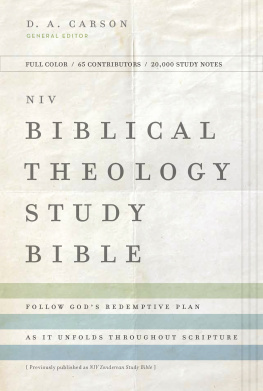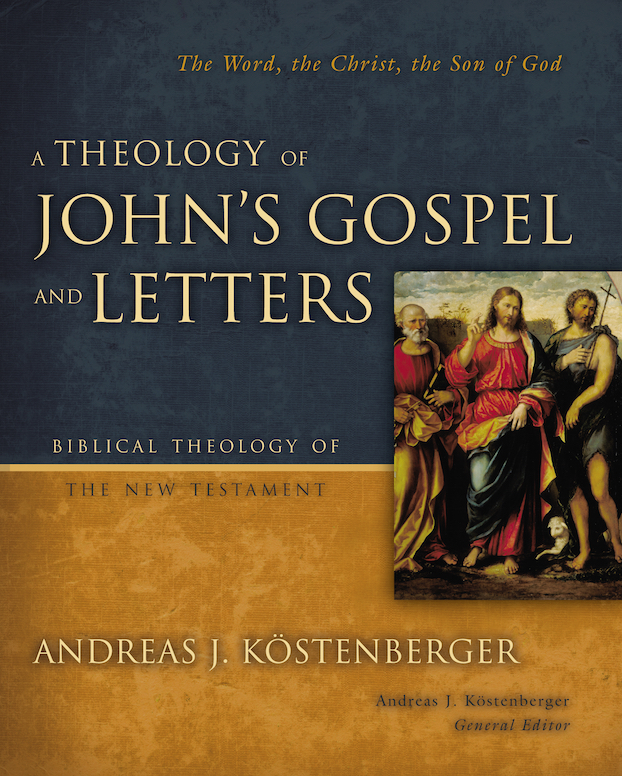
PRAISE FOR A THEOLOGY OF JOHNS GOSPEL AND LETTERS
For the comprehensiveness of its coverage in the field of Johannine theology (gospel and letters), there is nothing to compare to this work.
D. A. CARSON, research professor of New Testament,
Trinity Evangelical Divinity School
This book is a first in many ways: the first volume that sets the pattern for the quality and style of the new Biblical Theology of the New Testament series published by Zondervan; the first major volume to be devoted specifically to the theology of Johns gospel and letters at a high academic level; and the first volume to offer a thorough interpretation of the theology of an eyewitness of the life and passion of Jesus. Andreas Kstenberger has already laid a foundation for his study with his careful, detailed commentary on the gospel of John, and here presents a self-standing study that gathers together the thought of the Evangelist in a systematic and complete manner. I particularly welcome the way in which the book sets out Johns theological story in the gospel and letters before giving a detailed, thematic study
I. HOWARD MARSHALL, emeritus professor of New Testament exegesis and honorary research professor,
University of Aberdeen
Massive and masterful, this book presents Johannine theology in encyclopedic fullness. Arguing for apostolic authorship of Johns gospel and epistles, Andreas Kstenberger gives due weight to historical, literary, linguistic, and thematic matters in careful interaction with other scholars. Yet pastors and advanced students will also find the discussion accessible. We find here a new benchmark in synthetic treatment of these priceless writings of Christs beloved disciple.
ROBERT W. YARBROUGH, professor of New Testament,
Trinity Evangelical Divinity School
A T HEOLOGY OF
J OHNS G OSPEL AND L ETTERS
B IBLICAL T HEOLOGY OF THE N EW T ESTAMENT
A NDREAS J . K STENBERGER

ZONDERVAN
A Theology of Johns Gospel and Letters
Copyright 2009 by Andreas J. Kstenberger
ePub edition March 2015: ISBN 978-0-310-52326-0
Requests for information should be addressed to:
Zondervan, 3900 Sparks Dr. SE, Grand Rapids, Michigan 49546
Library of Congress Cataloging-in-Publication Data
Kstenberger, Andreas J., 1957
A theology of Johns Gospel and letters : the Word, the Christ, the Son of God / Andreas J. Kstenberger.
p. cm.(Biblical theology of the New Testament)
Includes bibliographical references and indexes.
ISBN 978-0-310-26986-1 (hardcover, printed)
1. Bible. N.T. JohnTheology. 2. Bible. N.T. Epistles of JohnTheology. I. Title.
BS2601.K67 2009
226.5'065 dc22
2009028347
All Scripture quotations, unless otherwise indicated, are taken from The Holy Bible, Todays New International Version, TNIV. Copyright 2001, 2005 by Biblica, Inc. Used by permission of Zondervan. All rights reserved worldwide.
Any Internet addresses (websites, blogs, etc.) and telephone numbers in this book are offered as a resource. They are not intended in any way to be or imply an endorsement by Zondervan, nor does Zondervan vouch for the content of these sites and numbers for the life of this book.
All rights reserved. No part of this publication may be reproduced, stored in a retrieval system, or transmitted in any form or by any meanselectronic, mechanical, photocopy, recording, or any otherexcept for brief quotations in printed reviews, without the prior permission of the publisher.
To the Word-Made-Flesh
And since they all [i.e. all four canonical Gospels]
had the same object, to show Christ,
the first three exhibit His body,
if I may be permitted to put it like that,
but John shows His soul.
John Calvin, 1553
C ONTENTS
The Biblical Theology of the New Testament series consists of eight distinct volumes covering the entire New Testament. Each volume is devoted to an in-depth exploration of a given New Testament writing, or group of writings, within the context of the theology of the New Testament, and ultimately of the entire Bible. While each corpus requires an approach that is suitable for the writing(s) studied, all volumes include:
(1) a survey of recent scholarship and of the state of research
(2) a treatment of the relevant introductory issues
(3) a thematic commentary following the narrative flow of the document(s)
(4) a treatment of important individual themes
(5) discussions of the relationship between a particular writing and the rest of the New Testament and the Bible
While Biblical Theology is a relatively new academic discipline and one that has often been hindered by questionable presuppositions, doubtful methodology, and/or flawed execution, the field is one of the most promising avenues of biblical and theological research today. In essence, Biblical Theology engages in the study of the biblical texts while giving careful consideration to the historical setting in which a given piece of writing originated. It seeks to locate and relate the contributions of the respective biblical documents along the lines of the continuum of Gods salvation-historical program centered in the coming and salvific work of Christ. It also endeavors to ground the theological exploration of a given document in a close reading of the respective text(s), whether narrative, discourse, or some other type of literature.
By providing in-depth studies of the diverse, yet complementary perspectives of the New Testament writings, the Biblical Theology of the New Testament series aims to make a significant contribution to the study of the major interrelated themes of Scripture in a holistic, context-sensitive, and spiritually nurturing manner. Each volume is written by a scholar who has written a major commentary or monograph on the corpus covered. The generous page allotment allows for an in-depth investigation. While coming from diverse academic backgrounds and institutional affiliations, the contributors share a commitment to an evangelical faith and a respect for the authority of Scripture. They also have in common a conviction that the canon of Scripture is ultimately unified, not contradictory.
In addition to contributing to the study of individual New Testament writings and to the study of the New Testament and ultimately of Scripture as a whole, the series also seeks to make a methodological contribution, showing how Biblical Theology ought to be conducted. In each case, the way in which the volume is conceived reflects careful consideration of the nature of a given piece or body of writings. The complex interrelationships between the three so-called Synoptic Gospels; the two-volume nature of LukeActs; the relationship between Johns gospel, letters, and the book of Revelation; the thirteen letters making up the Pauline corpus; and the theologies of Peter, James, and Jude, as well as Hebrews, each present unique challenges and opportunities.
In the end, it is hoped that the volumes will pay tribute to the multifaceted nature of divine revelation contained in Scripture. As G. B. Caird put it:
The question we must ask is not whether these books all say the same thing, but whether they all bear witness to the same Jesus and through him to the many splendoured wisdom of the one God.... We shall neither attempt to press all our witnesses into a single mould nor captiously complain that one seems at some points deficient in comparison with another. What we shall do is rejoice that God has seen fit to establish His gospel at the mouth of so many independent witnesses. The music of the New Testament choir is not written to be sung in unison.

